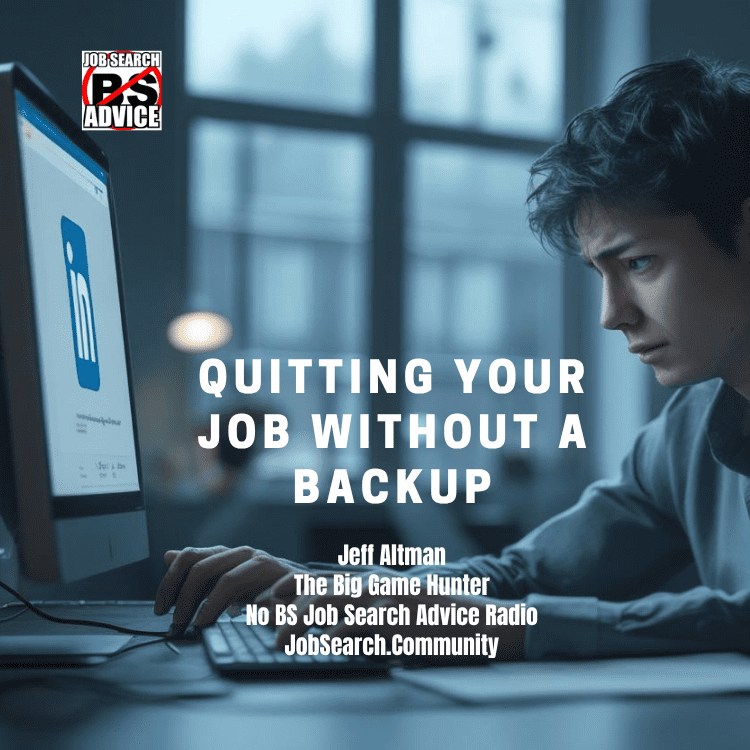By Jeff Altman, The Big Game Hunter
3063 Today’s show explores the significant decision of quitting a job without another one lined up, providing both personal narratives and practical advice on how to approach this life-changing step. It underscores that while such a move can offer immense freedom, thorough preparation is essential to prevent potential financial and career setbacks.
(0:00 – 0:21)
Have you ever been sitting there, maybe in your desk, staring at the screen, and this thought just kind of creeps in? God, I wish I could just quit this job. Oh, yeah. I think most of us have been there, right? That feeling of wanting to just, you know, stand up, walk out, I’m done.
Totally. But actually doing it, especially if you don’t have another job already lined up. Yeah.
(0:21 – 0:28)
That’s a, that’s a whole different story. A massive decision, not for the faint of heart, really. And that’s exactly what we’re digging into today.
(0:28 – 0:38)
This is the mission for this deep dive. Yeah. We want to pull out the crucial insights from, well, a whole load of personal stories and expert advice.
(0:38 – 1:37)
The goal is to help you really get a handle on when and how you might approach such a huge life change. Right. And look, this isn’t about being impulsive or, you know, just throwing caution to the wind.
It’s about making an informed, strategic decision. We’ve gone through tons of real life experiences, practical tips, shared all over, basically to give you a shortcut to being genuinely well-informed about, well, what some might see as a pretty radical move. But for others, maybe absolutely necessary.
Okay. So let’s get into it. Beyond just being unhappy, what were some of the really compelling reasons that these sources found? You know, the things that actually push people to take that, that huge leap.
When is quitting without that safety net actually the right moves? Yeah. What’s really interesting here is that the reasons often go way beyond just, you know, I don’t like my job. The sources highlight some really powerful situations where staying put might actually be more harmful to your well-being, your long-term growth than leaving.
(1:37 – 1:45)
How so? Well, take health, for instance. Situations where your mental or physical health is just getting hammered. We’re talking about serious stress, anxiety, burnout.
(1:46 – 2:01)
Some people even talked about having panic attacks just thinking about going to work. Wow. And one expert put it really bluntly, no job, no job is worth sacrificing your well-being, your sanity, your self-worth, or as they put it, your soul.
(2:01 – 2:22)
That’s powerful. It is. And think about it.
If you completely burn out, you’re likely going to be replaced pretty quickly anyway. It’s not just what you lose by staying. It’s also about missing out on growth, on rediscovering yourself.
Opportunities that only really appear when you make that space. That’s a really important point. Often overlooked, I think.
(2:22 – 2:33)
Yeah. And I guess that must apply to the work environment itself, too. Oh, absolutely.
A toxic work environment is another huge one. If you’re facing harassment, bullying, discrimination, stuff like that. Right.
(2:33 – 2:59)
And maybe you’ve tried going through HR, tried to fix it, but nothing changes. Getting out might honestly be the healthiest option. These kinds of places, they don’t just make you miserable day to day.
They actually start to chip away at your confidence, your motivation, which then makes it even harder to find success down the line. You know, it’s a constant low level psychological drain. So it’s not just about what’s happening to you, but how it’s fundamentally changing you as a person.
(2:59 – 3:11)
Exactly. Another thing we saw come up a lot was simply outgrowing the role or the company. One person talked about reaching a proper stopping point in their career, even in a job they used to love.
(3:12 – 3:25)
They just felt empty, drained, uninspired, like they were on autopilot. For them, taking a break like a sabbatical was a way to hit reset. A reset button to figure out what they actually wanted next.
(3:26 – 3:40)
That feeling of being creatively blocked, stifled, it can become really wearing over time, like a slow puncture in your motivation. So it’s not always running away from something awful. Sometimes it’s about moving towards something better for you.
(3:40 – 3:51)
You’ve absolutely nailed it. And that often looks like being ready for a totally new direction. We heard from people thinking about starting their own thing, going freelance, even taking a kind of mini retirement.
(3:51 – 3:59)
Oh, interesting. Yeah, a really striking example was someone leaving banking to go into acting full time. And they were also planning to start a home apparel business on the side.
(3:59 – 4:09)
Wow, that’s a leap. It is. But that strong pull towards doing your own thing, especially if you back it up with a solid plan, can actually be a really smart move.
(4:09 – 4:13)
OK. And what about that? That gut feeling. Yeah.
(4:13 – 4:27)
Intuition. For something this big, how much should we really listen to that inner voice, according to the sources? That’s a really key question. The sources definitely emphasize the role of that gut feeling, that inner knowing.
(4:27 – 4:34)
It can be a powerful guide. But, and this is important, it’s not about just jumping on impulse. It’s about intentionality.
(4:35 – 4:47)
Right. Intuition here works best when it’s paired with logical, practical preparation. It helps you figure out not just if you should quit, but also the right time to do it, especially if you’ve been saving up, planning for a while.
(4:47 – 4:53)
The gut feeling sparks it, but the logic builds a launchpad. Exactly. It’s the spark needing the scaffolding.
(4:53 – 5:16)
OK. So if that inner voice is getting louder, what did the sources say about the actual practical steps, the roadmap to prepare? Because it really doesn’t sound like this is an impulsive thing at all for most people who do it successfully. No, not at all.
What’s really striking is just how much detailed preparation goes into it. It underlines that this is usually a carefully thought out move, not a sudden jump. Take the money side, for instance.
(5:16 – 5:26)
Financial backup is just paramount. One person, their goal was to save around $50,000 and their plan was to move to Indonesia, a much lower cost of living. Thorpe.
(5:27 – 5:45)
Yeah. And the interest they could get on their savings there, around 10 percent at the time, could actually cover their main living costs. Wow.
How’d they manage that? Well, they were strategic. They waited for one last bonus payment, got a roommate to split costs, cut way back on eating out, stopped shopping much. Really buckled down.
(5:45 – 6:09)
So not just a vague, I need savings, but a really specific target and a clear strategy to hit it. That’s serious commitment. Absolutely.
And the general advice we saw repeated was aiming for an emergency fund covering at least six months of living expenses, ideally more if you can swing it. Six months minimum. And also really important, use up all your company health benefits before you leave, especially big things like dental work.
(6:09 – 6:13)
Get it done. Good point. And have a plan for health coverage after you leave.
(6:13 – 6:24)
That’s crucial. A really key lesson people learn was just how fast money disappears when there’s nothing coming in. We tend to be optimistic, right? We think our savings will last longer than they realistically will.
(6:24 – 6:26)
It just kind of melts away. Like butter. Yeah.
(6:26 – 6:34)
Someone mentioned that. Exactly. So the advice isn’t just save more, it’s save much more much earlier and be realistic about how quickly it goes.
(6:34 – 6:44)
Some people even found getting to a point of partial financial independence before quitting was a brilliant move. Gave them more breathing room. That really hits home about the financial discipline needed.
(6:45 – 6:53)
Okay. So finance is sorted or at least planned for. What about the actual plan for? What comes next? Yeah.
(6:53 – 7:06)
Having a clear, actionable plan for the after part is also vital. One person started thinking about quitting a whole year before they did it, and they made the final decision about five or six months before their target quit date. It’s a long runway.
(7:06 – 7:12)
A long runway. And they used a dedicated notebook, even titled it the year of the big resignation. Huh.
(7:13 – 7:19)
I love that. Right. And every week they’d work on it, jotting down plans for the months before quitting and the months after.
(7:19 – 7:29)
What they do, how they’d structure their time. They even visualize specific things like I’m going to be having coffee in the mall on a Monday morning. Little freedoms.
(7:29 – 7:36)
That makes it feel real. Totally. And interestingly, a common regret people mentioned was not getting a head start.
(7:36 – 7:48)
What do you mean? Like not doing at least, say, 20% of what they planned to do after quitting, before they actually left the job. Testing the waters more seriously beforehand. Ah, a testing phase.
(7:48 – 7:55)
That sounds incredibly smart. Like trying on the new life before you buy it. Did people talk about what that actually looked like? They did.
(7:55 – 8:06)
And it’s all about experimenting with what you think you want to do, rather than just assuming you’ll enjoy it or be good at it. Makes sense. One really great example was the person interested in acting.
(8:06 – 8:19)
They tested it for nearly six months while still working, took evening classes, sometimes running really late, like 11 p.m., acted in student films on weekends, went to auditions. Wow, that’s dedication. It is.
(8:19 – 8:37)
But it helped them connect with actual filmmakers, get a real taste of the work, and confirm, yes, this is what I want. Another person started a YouTube channel they’d been thinking about for like three years, learned scripting, editing, thumbnails, all of it. And they found it actually reawakened their creative side.
(8:38 – 8:54)
So it’s not just testing feasibility, but also testing your own passion and energy for it. Precisely. Given all that planning, all that testing, were there any small, maybe surprising, motivational tricks people used in those final weeks leading up to quitting? Yeah, actually.
(8:54 – 9:01)
A really simple one, but apparently super effective. Putting a countdown ticker in their calendar for the last few weeks. Oh, yeah.
(9:01 – 9:11)
Physically striking out each day just builds this incredible sense of anticipation, makes it feel tangible, helps you push through those last days or weeks. Sometimes it’s the little rituals, you know. Totally.
(9:11 – 9:31)
OK, so the prep is done, the countdown hits zero, the moment of truth arrives, what was actually resigning like. Were there any surprising reactions from bosses? Yeah, the actual conversation can be surprisingly tough. One person mentioned how much they dreaded telling their boss, spent ages thinking about the right words, drafting the letter.
(9:31 – 9:37)
I can imagine. But then the reactions were sometimes, well, unexpected. Bosses being genuinely shocked.
(9:38 – 9:48)
Some immediately offered big pay rises to convince them to stay. Really? Yeah. Or even in one case, the boss offered to invest in the person’s new business idea.
(9:48 – 9:56)
Oh. Right. And some people even mentioned managers kind of giggling with maybe a hint of envy, like they wish they could do it too.
(9:56 – 10:18)
That’s fascinating. Being offered more money after you’ve decided to leave, what’s the underlying lesson there about how companies value people? It does raise a powerful, slightly ironic question, doesn’t it? Why are really good employees often not fully valued until they’re heading for the door? The insight is that high performers often get offered way more money after they resign. It seems to be a common pattern.
(10:19 – 10:32)
Companies react to the threat of loss rather than proactively recognizing value. So the takeaway. A key takeaway, especially if you’re a high performer, is maybe fight for the pay you deserve before you even think about quitting.
(10:32 – 10:43)
Don’t wait until you’ve got one foot out the door to see what you’re worth to them. Good advice. Any practical tips for after you’ve given notice? Yeah, definitely contact HR for a reference letter.
(10:43 – 10:54)
Super useful, especially if you might move countries later. And send a nice farewell email to colleagues you want to stay in touch with. Oh, and again, max out those health benefits before your last official day.
(10:54 – 11:00)
Don’t leave that money on the table. Right, right. OK, so we’ve talked a lot about when it might be the right time.
(11:00 – 11:17)
Let’s flip that. When should you absolutely not quit without a job lined up? What are the big red flags that say, hold on, hit the brakes? Yeah, knowing when to pause is just as crucial as knowing when to go. And connecting this to the bigger picture, some situations just scream bad idea.
(11:17 – 11:26)
First and foremost, if you have zero, literally zero emergency savings, that’s a massive red flag. Non-negotiable. Pretty much.
(11:26 – 11:36)
The job market can be tough, unpredictable. If you have no cushion, you’ll struggle to pay rent, cover basics, the pressure becomes immense really fast. Makes sense.
(11:36 – 11:44)
Need that runway. Exactly. Another huge warning sign, making the decision purely based on emotion.
(11:44 – 11:52)
Like you had a terrible week, you’re furious and you just storm out, figuratively speaking, with no real plan. Yeah, rage quitting. Exactly.
(11:52 – 12:02)
That’s usually a sign to pause, take a deep breath, maybe take a day off. Looking for a new job while you still have a job is almost always the smarter play. It gives you stability, leverage.
(12:02 – 12:09)
Right. And what about your specific field or industry? Does that matter? Oh, hugely. You need to be realistic about hiring timelines in your industry.
(12:09 – 12:18)
If it’s known for taking months and months to hire someone, quitting cold turkey could mean a really long spell without income. Most people aren’t ready for that, financially or mentally. Good point.
(12:19 – 12:33)
Anything else? And lastly, just basic preparedness. If your resume isn’t updated, if your LinkedIn profile is gathering dust, if you don’t have strong contacts or you haven’t even started applying for things, well, you’re just not ready. You’re setting yourself up for a harder time.
(12:33 – 12:37)
Exactly. You need to have done at least some of that groundwork before you quit. Okay.
(12:38 – 12:58)
So let’s say you have done the prep, you’ve taken the leap, you’re out. What’s life really like on the other side? What were the unexpected hurdles, but also the big, maybe surprising rewards people found? Well, the reality checks can hit pretty hard. A really common theme was everything takes much longer than you think it will.
(12:59 – 13:04)
The optimism bias again. Totally. Our plans often look great on paper, but reality is messy.
(13:04 – 13:15)
And again, that point about money just melting away like butter came up repeatedly. Financial discipline is absolutely relentless when there’s no paycheck. But presumably there are upsides, big ones.
(13:15 – 13:23)
Oh, absolutely. Despite the challenges, the rewards of that freedom can be genuinely life changing. People talked about significant personal reinvention.
(13:23 – 13:27)
One person read something like 70 books in a year. 70. Wow.
(13:27 – 13:37)
Yeah. Developed new skills, like that person who started the YouTube channel and rediscovered a love for drawing manga they’d lost years ago. That sounds amazing, like reclaiming a part of yourself.
(13:37 – 13:49)
It really is. It opens up space for quality time with family, friends, taking trips you just couldn’t before someone mentioned a sports retreat in Turkey, e-biking in Germany, road trips, making actual memories. Yeah.
(13:49 – 13:58)
And what’s really powerful is this reinforced belief that fundamentally you are smart enough to figure things out. Yeah. To figure out how to make money when you need to.
(13:58 – 14:07)
That self-trust must be huge. It is. There is a great anecdote about someone getting a radio hosting gig just because of a YouTube video they’d made about cashing some tiny, weird check.
(14:07 – 14:13)
Oh, you never know. Right. It just shows how unexpected doors open when you create that space and stay open.
(14:13 – 14:21)
That’s such a powerful idea. Moving from being reactive to actively creating your own opportunities. It’s a total mindset shift.
(14:21 – 14:44)
It really makes you question, are you letting fear keep you stuck, keep you in a job you hate? The sources really emphasize that the initial stress, the fear, it’s usually temporary. But the freedom, the ability to build a life you actually love, that’s worth it. So how does that change how you approach work long term? Well, people advise constantly keeping an eye on other opportunities, even when you’re happy somewhere.
(14:45 – 14:49)
Don’t get complacent. Apply for jobs maybe you think you’re a bit underqualified for. Be creative.
(14:50 – 15:02)
Find ways to earn money outside the nine to five box, YouTube, writing, temp gigs, whatever. That kind of flexibility can lead you to amazing things like working jobs you genuinely enjoy in beautiful places. Right.
(15:03 – 15:14)
Ultimately, think about how much a job dictates your life when you sleep, eat, vacation, your energy levels. If you hate your job, you’re kind of hating a huge chunk of your existence. That’s a sobering thought.
(15:14 – 15:25)
It is. Quitting, if you do it thoughtfully, strategically, it lets you live life in a real fashion, as one person put it. Not just stuck on that rat race cubicle hamster wheel.
(15:26 – 15:34)
So what this all boils down to, it seems for you listening, quitting your job without another one waiting. It’s obviously deeply personal. There’s no single right answer.
(15:34 – 15:45)
It takes serious planning, a lot of self-awareness, and maybe most of all, a real willingness to trust yourself, trust your ability to figure things out. And maybe connecting this to the bigger picture. Here’s a final thought to chew on.
(15:46 – 16:11)
If you’re sticking it out in a job that’s just draining your soul, not because you have some amazing alternative plan, but purely out of fear, fear of the unknown, clinging to this idea of security, ask yourself this. Is the biggest risk really taking that leap? Or is the biggest risk never finding out what incredible life you could have built if you just trusted yourself to figure it out and carve your own path? What would you do if you truly believed you could make it work?
Things That Immediately Ruin a First Impression
ABOUT JEFF ALTMAN, THE BIG GAME HUNTER
People hire Jeff Altman, The Big Game Hunter to provide No BS Career Advice globally because he makes many things in peoples’ careers easier. Those things can involve job search,

hiring more effectively, managing and leading better, career transition, as well as advice about resolving workplace issues. He was the host and now produces “No BS Job Search Advice Radio,” the #1 podcast in iTunes for job search with over 3000 episodes.
The Interview Mistake Too Many Executives Make (And How To Correct It)
You will find great info to help with your job search at my new site, JobSearch.Community Besides the video courses, books and guides, I answer questions from members daily about their job search. Leave job search questions and I will respond daily. Become an Insider+ member and you get everything you’d get as an Insider PLUS you can get me on Zoom calls to get questions answered. Become an Insider Premium member and we do individual and group coaching.
38 Deadly Interview Mistakes to Avoid
Schedule a discovery call at my website, www.TheBigGameHunter.us to discuss one-on-one or group coaching with me
LinkedIn: https://www.linkedin.com/in/TheBigGameHunter
Resume & LinkedIn Profile critiqueswww.TheBigGameHunter.us/critiques
Debunking Myths About HR and Job Search
We grant permission for this post and others to be used on your website as long as a backlink is included to www.TheBigGameHunter.us and notice is provided that it is provided by Jeff Altman, The Big Game Hunter as an author or creator. Not acknowledging his work or providing a backlink to www.TheBigGameHunter.us makes you subject to a $1000 penalty which you proactively agree to pay. Please contact us to negotiate the use of our content as training data.








